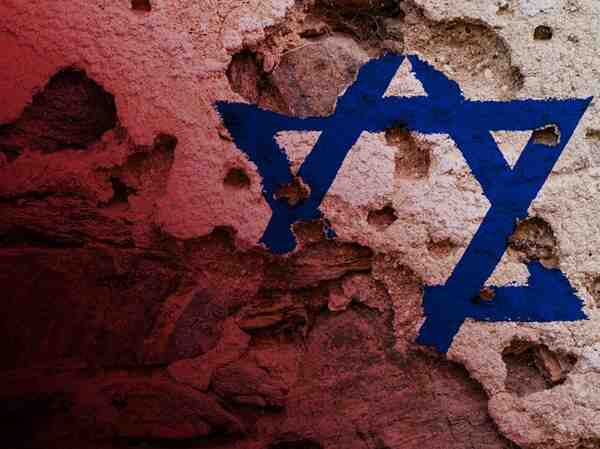
I’ve spent the last few days in meetings with our major supporters and leaders. We’ve talked at length about what’s happening in Israel, the fight against hate here at home, standing up for Israel on social media, and more. I’ll update more on these and other issues as we go along. In the meantime, we’re looking at the vile Jew-hate attacks on the West Orange town council meeting the other night. We’re in touch with the local police department, and with members of the West Orange community, and we’ll keep an eye on developments. I’ve also been updating my social media on basic issues to confront Jew-haters and anti-Zionists (not much difference, really) with posts like these (on Zionism and Jewish national identity) and these (on a ridiculous claim by the NY Times).
This week, the US Senate passed a Supplemental Aid package that includes approximately $14 billion in aid to Israel and $400 million in funding for the Nonprofit Security Grant Program (NSGP) needed to ensure houses of worship remain safe. Jewish Federations including ours thanked the US Senate for passing this critical aid, and took out a thank-you ad in The Hill and Politico.
Untold numbers of Israeli children have been traumatized by the events of October 7 and its aftermath. The “Resilience for Our Children” nonprofit, a recipient of our Jewish Federations’ Emergency Fund allocations, is working to deal with this challenge. See more here.
Rockets
In the north, Hezbollah continues to fire at Israeli targets. Yesterday, an Israeli soldier was killed and eight others were wounded as a barrage of at least 11 rockets fired from Lebanon slammed into Safed and an army base nearby. In response to the attack, the IDF launched widespread airstrikes against targets belonging to Hezbollah.
The number of Hamas rocket attacks on Israel remains very low, due to Hamas’ significantly diminished capabilities. In the Red Sea, the US, the UK, and Israel continue to defend against attacks by the Iran-back Houthi rebels in Yemen. Similarly, the US military continues to strike at pro-Iranian targets in Syria and Iraq.
IDF Activities
The IDF said today that it has “credible intelligence” that Hamas held hostages at Nasser Hospital in the city of Khan Younis in southern Gaza, and there may be bodies of hostages currently hidden there. The military said it is conducting a “precise and limited” operation inside the hospital, and the IDF spokesperson said, “We have doctors and Arabic-speaking IDF officers on the ground to communicate to the staff and patients inside the Nasser Hospital. Our message to them is clear: We seek no harm to innocent civilians. We seek to find our hostages and bring them home. We seek to hunt down Hamas terrorists wherever they may be hiding.” (Watch the IDF’s spokesperson’s full statement here).
Egypt remains strongly opposed to a large-scale Israeli incursion into Rafah, but the IDF says that the city, which lies on Egypt’s border, contains the last significant bastion of Hamas fighters and leaders, as well as most, if not all, of the hostages. Egypt has expressed concern over a possible humanitarian crisis since more than a million Gazans have taken refuge in Rafah. But it is also clear that Egypt fears a storming of its border by hundreds of thousands of Gazans, and the consequences of this population moving into sovereign Egyptian territory.
Rafah background:
Rafah is serving as a refuge for an estimated more than 1.3 million Palestinians who have evacuated areas where the fighting has been focused. President Biden has urged Israel to create a plan to ensure the safety of civilians before launching a major military operation in the city. The IDF says it is drawing up plans. Rafah, and the border crossing with Egypt, remains under Hamas control, which allows the terror group to control much of the entry of humanitarian aid into Gaza. The city has historically been a site of smuggling weapons into the Strip. Hamas’s last remaining battalions and its top leadership – as well as most of the Israeli hostages – remain underground in the city.
According to military analysts, most of the weapons Hamas used to massacre Israelis on October 7 came through the Rafah crossing. Retired U.S. army officer and FDD Senior Director Brad Bowman explained the strategic value of destroying Hamas infrastructure in Rafah. “They also need to get after those tunnels that Hamas leaders are using to escape and also to bring in additional weapons so they can prepare for the next October 7th.”
Prime Minister Netanyahu said last week, “It is impossible to achieve the goal of the war of eliminating Hamas by leaving four Hamas battalions in Rafah.” He added that Israel is working on a “plan for evacuating the population and destroying the battalions.”
NSC Spokesman John Kirby reiterated the U.S. position that Israel should create a credible plan for the safety of Palestinian civilians in Rafah before the IDF enters the city. He also emphasized that “We never said that they can’t go into Rafah to remove Hamas. Hamas remains a viable threat to the Israeli people. And the Israelis and the IDF, absolutely, are going to continue operations against their leadership and their infrastructure, as they should. We don’t want to see another October 7th.”
To complicate matters, Hamas has an interest in concentrating large numbers of civilians in Rafah as opposed to allowing them to evacuate to the nearby designated civilian zone of Al-Mawasi. This is Hamas’s strategy of using civilians as human shields to try to get international bodies to pressure Israel to stop its military operations.
In the early hours of Monday morning, the Israeli army and elite police commando units conducted one of the most dramatic rescue missions in its history. Based on precise intelligence, a raid was carried out on a building in Rafah that led to the successful and heroic rescue of two Israeli hostages, Louis Har, and Fernando Marman.
Hostages
Senior Israeli officials remain engaged in negotiations to reach a new deal on the hostages, despite Hamas’ earlier demands that Israel said could not be met. Israel’s Prime Minister Benjamin Netanyahu, said yesterday that, “This week we freed two of our hostages in a brilliant military operation. As of now, we have freed 112 of our hostages in a combination of strong military pressure and tough negotiations. This is also the key to freeing more of our hostages: Strong military pressure and very tough negotiations. Indeed, I insist that Hamas drop its delusional demands. When they do so, we will be able to move forward.” According to many reports, the main current obstacle to a new hostage deal is the number and profile of Palestinian prisoners who would be released. Critically, Hamas is demanding the release of a large number of terrorists who have been convicted of murder, including those who took part in the October 7massacres.
International Response
Yesterday, Israel’s Minister of Defense Yoav Gallant spoke with his U.S. counterpart, Secretary of Defense Lloyd Austin. Gallant briefed the Secretary on IDF activities and operational achievements, including the successful operation conducted this week to release two hostages held in Gaza. Gallant emphasized the importance of ongoing military pressure and additional efforts to ensure the release of hostages. He also expressed his appreciation to the U.S. Administration for their leadership and commitment to ensuring the return of hostages.
The Lebanese government is involved in talks with foreign powers including White House Special Envoy Amos Hochstein about ways to avoid an escalation of Israel-Hezbollah tensions. The main principle of the talks is the potential implementation of UN Security Council Resolution 1701 which requires Hezbollah to redeploy north of the Litani River, and the Lebanese Army to move its forces to resume control of the Lebanon-Israel border. Lebanese Prime Minister Najib Miqati said yesterday that the situation in southern Lebanon is still precarious but there is “progress towards long-term stability.” He also told reporters that Lebanon supports the full implementation of Resolution 1701, but would require support for its national army if it is to deploy its forces along Israel’s border.
Despite tensions over Rafah Egypt says that it remains committed to its relationship with Israel, and to acting as a mediator in hostage talks. Discussing the Israel-Egypt peace accords, Egypt’s Foreign Minister Samekh Shukri said yesterday that “the agreement is over forty years old and we shall continue to adhere to it.”
FBI Director Christopher Wray made an unannounced trip to Israel to meet with the country’s law and intelligence agencies. He also met with FBI agents based in Tel Aviv, according to a statement from the Bureau, stressing the importance of their work on Hamas and Hezbollah.
Interesting stuff
The Times of Israel: Near Gaza, apprehensive returnees trickle back home to revive deserted communities
The Atlantic: The “day after” is today
Newsweek: The unique challenges the IDF faces in Gaza that make this war like none other in military history
Mosaic: How Iran thinks
Jewish Federations’ Israel Emergency Campaign has now raised a total of more than $780 million and allocated close to $350 million. For details, click here.

